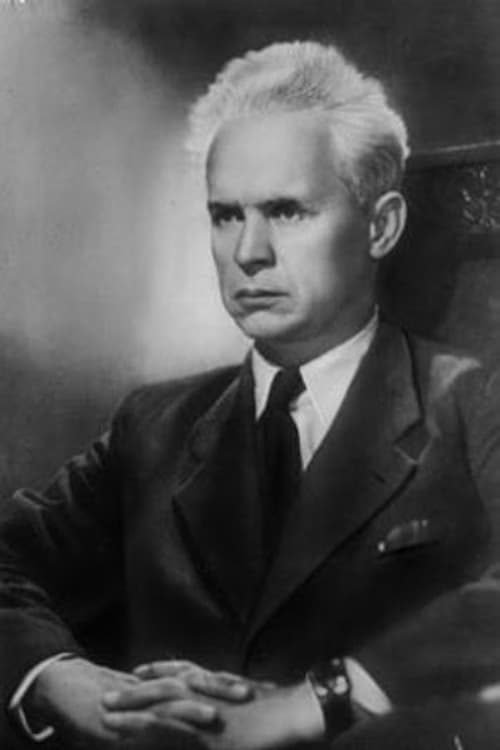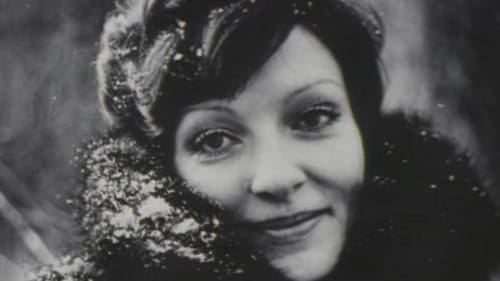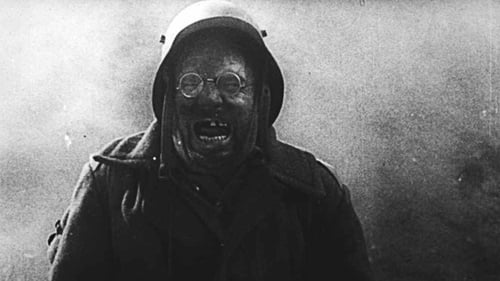
Oleksandr Dovzhenko
Nacimiento : 1894-09-10, Viunyshche, Chernigov Governorate, Russian Empire (now part of Sosnytsia town in Chernihiv Oblast, Ukraine)
Muerte : 1956-11-25
Historia
From Wikipedia, the free encyclopedia
Oleksandr Petrovych Dovzhenko was a Ukrainian Soviet screenwriter, film producer and director. He is often cited as one of the most important early Soviet filmmakers, alongside Sergei Eisenstein, Dziga Vertov, and Vsevolod Pudovkin, as well as being a pioneer of Soviet montage theory.
Although Oleksandr Dovzhenko's parents were uneducated, his semi-literate grandfather encouraged him to study, leading him to become a teacher at the age of 19. Dovzhenko turned to film in 1926 when he landed in Odesa. His ambitious drive led to the production of his second-ever screenplay, Vasya the Reformer (which he also co-directed). He gained greater success with Zvenyhora in 1928 which established him as a major filmmaker of his era. His following "Ukraine Trilogy" (Zvenyhora, Arsenal, and Earth), although underappreciated by some contemporary Soviet critics (who found some of its realism counter-revolutionary), is his most well-known work in the West. For his film Shchors, Dovzhenko was awarded the Stalin Prize (1941); eight years later, in 1949, he was awarded another Stalin Prize for his film Michurin.
After spending several years writing, co-writing and producing films at Mosfilm Studios in Moscow, he turned to writing novels. Over a 20-year career, Dovzhenko personally directed only 7 films.
He was a mentor to the young Ukrainian Soviet filmmakers Larysa Shepitko and Sergei Parajanov. Dovzhenko died of a heart attack on November 25, 1956 in his dacha in Peredelkino. His wife, Yulia Solntseva, continued his legacy by producing films of her own and completing projects Dovzhenko was not able to create.
The Dovzhenko Film Studios in Kyiv were named after him in his honour following his death.

Story
While watching Dovzhenko's Earth a young man imagines himself a painter in a Ukrainian village in the 1930s. All is pastoral idyll until the authorities arrive with Soviet wrath for tradition and religion.

Self (archive footage)
Elem Klimov's documentary ode to his wife, director Larisa Shepitko, who was killed in an auto wreck.

Writer
The film-remembrance of the creative fate of the Ukrainian Soviet film director Alexander Dovzhenko, shot on his diaries.
It has his statements about his work, about the role of the artist in society, his plans and sources of inspiration, his artistic style and the peculiarities of his worldview.
Used excerpts from his films and documentary footage taken during the director's life, as well as filmed fragments of the unfinished scripts " The Death of the Gods” and “Tsar”.

Story
About hardships of the first years of War, which fell to the lot of ordinary people in Ukraine, who got under the yoke of fascist occupation, and heroic struggle against the invaders. A young Russian woman asks a Red Army soldier to spend the night with her in the wake of the Nazi invasion. Fearing she may soon perish, the woman hopes for one night of romance before what could be a horrible demise.

Novel
Based on the novel of the same name by Oleksandr Dovzhenko. About the childhood of the famous Soviet film director Oleksandr Dovzhenko, who was born on the ancient lands of Chernihiv, along the banks the Desna. The film consists of two parts. The first is the world shown through the impressions of the six-year-old Sashko. The second is the recollections and reasoning of Sashko, now an elderly colonel who liberates his native village during the war.

Writer
Once again, director Yulia Solnsteva directs a movie that her late husband Alexandre Dovchenko scripted but did not live long enough to shoot. In this wartime drama, the emphasis is on the heroics of both the civilians and the soldiers during times of severe stress in World War II. At the core of the action is one man in particular, whose sacrifices and heroics speak for a much larger group.

Writer
A Soviet dam project means that many old Ukrainian villages will end up under water. There are conflicts between the dam engineers and villagers who don't want to move.

Screenplay
An unfinished film by Aleksandr Dovzhenko, the film is a political lampoon based on the book entitled The Truth about US Diplomats, written in 1949 by the American writer Annabel Bukar. It exposes the underhanded actions of US Embassy personnel in Moscow at the onset of the Cold War. Dovzhenko managed to shoot only a half of the film, mainly the scenes that take place in the American Embassy.

Director
An unfinished film by Aleksandr Dovzhenko, the film is a political lampoon based on the book entitled The Truth about US Diplomats, written in 1949 by the American writer Annabel Bukar. It exposes the underhanded actions of US Embassy personnel in Moscow at the onset of the Cold War. Dovzhenko managed to shoot only a half of the film, mainly the scenes that take place in the American Embassy.

Writer
About the life of the Russian biologist Ivan Michurin. 1912 year. Having rejected American offers to work abroad, Michurin continues his research in the Russian Empire, despite the fact that his ideas are not perceived by the tsarist government, the church and idealistic science. Michurin is supported by prominent scientists of the country and he continues to work hard. After the October Revolution, a small Michurin garden in the city of Kozlov (the biologist's homeland) becomes a large state nursery.

Director
About the life of the Russian biologist Ivan Michurin. 1912 year. Having rejected American offers to work abroad, Michurin continues his research in the Russian Empire, despite the fact that his ideas are not perceived by the tsarist government, the church and idealistic science. Michurin is supported by prominent scientists of the country and he continues to work hard. After the October Revolution, a small Michurin garden in the city of Kozlov (the biologist's homeland) becomes a large state nursery.

Director
Dovzhenko and Solntseva's documentary about the end of the war.

Director
A 1943 Soviet documentary war film by Ukrainian director Alexander Dovzhenko and Yuliya Solntseva. It is Dovzhenko's second World War II documentary, and dealt with the Battle of Kharkov. The film incorporates German footage of the invasion of Ukraine, which was later captured by the Soviets.

(archive footage)

Director
Wartime documentary by Dovzhenko and Solntseva.

Screenplay
The year is 1919. German troops retreat from Ukraine. The Directory, the Ukrainian national government lead by Symon Petliura, takes control of Kyiv. Meanwhile, the Bolshevik division commanded by Mykola Shchors is marching on the capital. The Bolsheviks capture the cities of Vinnytsia, Zhmerynka, and others one by one, but lose Berdychiv to Petliura’s forces. They are demoralized by the defeat. By his personal example of courage and military skill, Shchors inspires the retreating Red troops and leads them to victory over the enemy.

Director
The year is 1919. German troops retreat from Ukraine. The Directory, the Ukrainian national government lead by Symon Petliura, takes control of Kyiv. Meanwhile, the Bolshevik division commanded by Mykola Shchors is marching on the capital. The Bolsheviks capture the cities of Vinnytsia, Zhmerynka, and others one by one, but lose Berdychiv to Petliura’s forces. They are demoralized by the defeat. By his personal example of courage and military skill, Shchors inspires the retreating Red troops and leads them to victory over the enemy.

Director
Dovzhenko and Solntseva's documentary about the Bukovina region.

Writer
Aerograd is a 1935 Soviet film by Ukrainian director Olexander Dovzhenko, Mosfilm-VUFKU coproduction. It is a futuristic adventure story set in the Soviet Far East. Considered one of two sound masterpieces by Dovzhenko, the other being "Ivan".

Director
Aerograd is a 1935 Soviet film by Ukrainian director Olexander Dovzhenko, Mosfilm-VUFKU coproduction. It is a futuristic adventure story set in the Soviet Far East. Considered one of two sound masterpieces by Dovzhenko, the other being "Ivan".

Director
After the critical lambasting of his masterpiece Earth, Dovzhenko returned with a more popular iteration of its main motifs. Much like Earth, Ivan concerns itself with the natural rhythms of country life, disrupted by the beat of looming industrialisation.

Editor
Un viejo campesino ucraniano se dispone a morir sobre la tierra en la que ha trabajado toda su vida. Su nieto, Vasil, decide entonces que el consejo de la villa debe comprar un tractor para compartirlo entre los granjeros, que unidos vencerán a las dificultades de la naturaleza y a la opresión de los ricos terratenientes. (FILMAFFINITY)

Writer
Un viejo campesino ucraniano se dispone a morir sobre la tierra en la que ha trabajado toda su vida. Su nieto, Vasil, decide entonces que el consejo de la villa debe comprar un tractor para compartirlo entre los granjeros, que unidos vencerán a las dificultades de la naturaleza y a la opresión de los ricos terratenientes. (FILMAFFINITY)

Director
Un viejo campesino ucraniano se dispone a morir sobre la tierra en la que ha trabajado toda su vida. Su nieto, Vasil, decide entonces que el consejo de la villa debe comprar un tractor para compartirlo entre los granjeros, que unidos vencerán a las dificultades de la naturaleza y a la opresión de los ricos terratenientes. (FILMAFFINITY)

Producer
A soldier returns to Kyiv after surviving a train crash and encounters clashes between nationalists and collectivists.

Writer
A soldier returns to Kyiv after surviving a train crash and encounters clashes between nationalists and collectivists.

Director
A soldier returns to Kyiv after surviving a train crash and encounters clashes between nationalists and collectivists.

Editor
The momentous film stars Mykola Nademskyi as the grandfather of Tymish (Semen Svashenko), whom he alerts to secret treasure buried in the mountains of Zvenygora – Treasure that rightfully belongs to his homeland. The film wonderfully blends both lyricism and politics and uses its central construct to build a montage praising Ukrainian industrialization, attacking the bourgeoisie, celebrating the beauty of the Ukrainian steppe and retelling ancient folklore. Said Sergei Eisenstein of the film, "As the lights went on, we felt that we had just witnessed a memorable event in the development of the cinema".

Writer
The momentous film stars Mykola Nademskyi as the grandfather of Tymish (Semen Svashenko), whom he alerts to secret treasure buried in the mountains of Zvenygora – Treasure that rightfully belongs to his homeland. The film wonderfully blends both lyricism and politics and uses its central construct to build a montage praising Ukrainian industrialization, attacking the bourgeoisie, celebrating the beauty of the Ukrainian steppe and retelling ancient folklore. Said Sergei Eisenstein of the film, "As the lights went on, we felt that we had just witnessed a memorable event in the development of the cinema".

Director
The momentous film stars Mykola Nademskyi as the grandfather of Tymish (Semen Svashenko), whom he alerts to secret treasure buried in the mountains of Zvenygora – Treasure that rightfully belongs to his homeland. The film wonderfully blends both lyricism and politics and uses its central construct to build a montage praising Ukrainian industrialization, attacking the bourgeoisie, celebrating the beauty of the Ukrainian steppe and retelling ancient folklore. Said Sergei Eisenstein of the film, "As the lights went on, we felt that we had just witnessed a memorable event in the development of the cinema".

Stoker
The film's plot is based on the real murder of the Soviet diplomatic courier Theodor Nette abroad. The pouch of the Soviet diplomat, which is stolen by British spies, is taken away by the sailors of a ship sailing to Leningrad who deliver it to the authorities. The intelligence agents make every effort to retrieve the bag.

Producer
The film's plot is based on the real murder of the Soviet diplomatic courier Theodor Nette abroad. The pouch of the Soviet diplomat, which is stolen by British spies, is taken away by the sailors of a ship sailing to Leningrad who deliver it to the authorities. The intelligence agents make every effort to retrieve the bag.

Writer
The film's plot is based on the real murder of the Soviet diplomatic courier Theodor Nette abroad. The pouch of the Soviet diplomat, which is stolen by British spies, is taken away by the sailors of a ship sailing to Leningrad who deliver it to the authorities. The intelligence agents make every effort to retrieve the bag.

Director
The film's plot is based on the real murder of the Soviet diplomatic courier Theodor Nette abroad. The pouch of the Soviet diplomat, which is stolen by British spies, is taken away by the sailors of a ship sailing to Leningrad who deliver it to the authorities. The intelligence agents make every effort to retrieve the bag.

Editor
Dovzhenko's debut film, it deals with a dandified barber's attempts to get rid of his "love berry" - his illegitimate offspring. Although a farce, its permissive sexuality can still be considered to be risque.

Writer
Dovzhenko's debut film, it deals with a dandified barber's attempts to get rid of his "love berry" - his illegitimate offspring. Although a farce, its permissive sexuality can still be considered to be risque.

Director
Dovzhenko's debut film, it deals with a dandified barber's attempts to get rid of his "love berry" - his illegitimate offspring. Although a farce, its permissive sexuality can still be considered to be risque.

Director
Lost film directed by Oleksandr Dovzhenko and Faust Lopatinsky.














